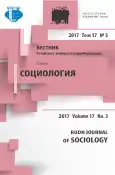THE ART OF NOT BEING GOVERNED: ORALITY, WRITING, AND TEXTS
- Авторлар: Scott J1
-
Мекемелер:
- Yale University
- Шығарылым: Том 17, № 3 (2017)
- Беттер: 267-288
- Бөлім: Theory, Methodology and History of Sociological Research
- URL: https://journal-vniispk.ru/2313-2272/article/view/340505
- DOI: https://doi.org/10.22363/2313-2272-2017-17-3-267-288
- ID: 340505
Дәйексөз келтіру
Толық мәтін
Аннотация
Авторлар туралы
J Scott
Yale University
Email: james.scott@yale.edu
Box 208209, New Haven, CT 06520-8206
Әдебиет тізімі
- Andaya B.W. To Live as Brothers: Southeast Sumatra in the Seventeenth and Eighteenth Centuries. Honolulu: University of Hawai’i Press; 1993.
- Buckley Ebery P. The Cambridge Illustrated History. Cambridge University Press; 1996.
- Collins J., Blot R. Literacy and Literacies: Text, Power, and Identity. Cambridge University Press; 2003.
- Cummings W. Making Blood White: Historical Transformations in Early Modern Makassar. Honolulu: University of Hawai’i Press; 2002.
- Evrard O. Interethnic systems and localized identities: The Khmu subgroups (Tmoy) in Northwest Laos. Social Dynamics in the Highlands of Southeast Asia: Reconsidering the Political Systems of Highland Burma by E.R. Leach. Ed. by F. Robinne, M. Sadan. Leiden: Brill; 2007.
- Fiskesjö M. The Fate of Sacrifice and the Making of Wa History. Ph.D. thesis. University of Chicago; 2000.
- Fonseca I. Bury Me Standing: The Gypsies and Their Journey. N.Y.: Knopf; 1995.
- Harris R. Rethinking Writing. L.: Athlone; 2000.
- Harris R. The Origin of Writing. L.: Duckworth; 1986.
- Havelock E.A. The Muse Learns to Write: Reflections on Orality and Literacy from Antiquity to the Present. New Haven: Yale University Press; 1986.
- Heather P. The Fall of the Roman Empire: A New History of Rome and the Barbarians. Oxford University Press; 2006.
- Hill P. The World Turned Upside Down: Radical Ideas during the English Revolution. Harmondsworth: Penguin; 1975.
- Janko R. Born of Rhubarb. Review of M.L. West “Indo-European Poetry and Myth”. Oxford University Press, 2008. Times Literary Supplement. February 22, 2008.
- Jonsson H. Shifting Social Landscape: Mien (Yao) Upland Communities and Histories in State- Client Settings. Ph.D. diss. Cornell University; 1996.
- Kopytoff I. The African Frontier: The Reproduction of Traditional African Societies. Bloomington: Indiana University Press; 1987.
- Kosseleck R. The Practice of Conceptual History: Timing, History, Spacing Concepts. Stanford University Press; 2002.
- Larsen M.T. Introduction “Literacy and social complexity”. State and Society: The Emergence and Development of Social Hierarchy and Political Centralization. Ed. by J. Gledhill, B. Bender, М.T. Larsen. L.: Routledge; 1988.
- Leach E. The Political Systems of Highland Burma: A Study of Kachin Social Structure. Cambridge: Harvard University Press; 1954.
- Levi-Strauss P. Tristes Tropiques. Trans. by J. Weightman, D. Weightman. N.Y.: Atheneum; 1968.
- Lewis P. Ethnographic Notes on the Akha of Burma. New Haven: HRA Flexbooks; 1969-1970. Vol. I.
- Lord A. The Singer of Tales. N.Y.: Atheneum, 1960.
- Michaud J. Historical Dictionary of the Peoples of the Southeast Asian Massif. Lanham: Scarecrow; 2006.
- Nieke M.R. Literacy and power: The introduction and use of writing in early historic Scotland. State and Society: The Emergence and Development of Social Hierarchy and Political Centralization. Ed. by J. Gledhill, B. Bender, М.T. Larsen. L.: Routledge; 1988.
- Rastdorfer J.-M. On the Development of Kayah and Kayan National Identity: A Study and a Bibliography. Bangkok: Southeast Asian Publishing; 1994.
- Reid A. Southeast Asia in the Age of Commerce, 1450-1680. Vol. I. The Lands Below the Winds. New Haven: Yale University Press; 1988.
- Renard R.D. Kariang: History of Karen-Tai Relations from the Beginnings to 1923. Ph.D. diss. University of Hawai’I; 1979.
- Richards T. Archive and utopia. Representations. 1992; 37.
- Rosaldo R. Ilongot Headhunting, 1883-1974: A Study in Society and History. Stanford University Press; 1980.
- Sadan M.J. History and Ethnicity in Burma: Cultural Contexts of the Ethnic Category “Kachin” in the Colonial and Postcolonial State, 1824-2004. Bangkok; 2005.
- Scott J.G. [Shway Yoe]. The Burman: His Life and Notions. N.Y.: Norton; 1963.
- Tapp N. Sovereignty and Rebellion: TheWhite Hmong of Northern Thailand. Singapore: Oxford University Press; 1990.
- Trager F.N., Koenig W.J., Yi Yi. Burmese Sit-tans, 1764-1826: Records of Rural Life and Administration. Tucson: University of Arizona Press; 1979.
- Vansina J. Oral History as Tradition. L.: James Currey, 1985.
- von Geusau L.A. Akha internal history: Marginalization and the ethnic alliance system. Civility and Savagery: Social Identity in Tai States. Ed. by A. Turton. Richmond: Curzon; 2000.
- Walker A.R. Merit and the Millennium: Routine and Crisis in the Ritual Lives of the Lahu People. Delhi: Hindustan Publishing; 2003.
Қосымша файлдар









